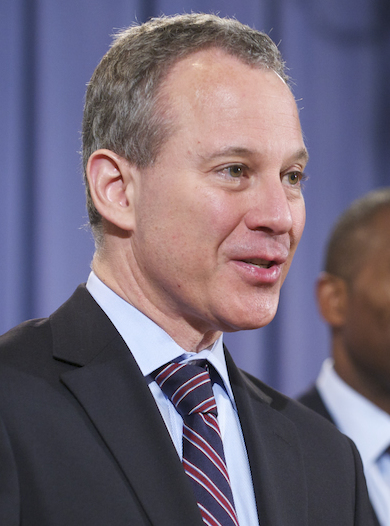
NEW YORK — Former New York Attorney General Eric Schneiderman used nearly $340,000 in political campaign funds to pay the law firm that represented him during an investigation of allegations that he physically abused several women, according to campaign finance reports reviewed by The Associated Press.
The practice is legal, but reform activists say Schneiderman and other politicians are exploiting lax campaign finance rules.
“By and large, if you are an elected official, you can use your campaign contributions as a Get Out of Jail Free card,” said Blair Horner, the executive director of the New York Public Interest Research Group.
Schneiderman’s re-election committee, Schneiderman 2018, began paying the Clayman & Rosenberg LLP law firm the week after his abrupt May 7 resignation from office, the records show. The last payment was made Dec. 7, a month after a special prosecutor closed the investigation without filing charges.
Schneiderman, a Democrat and nemesis of President Donald Trump, announced his resignation hours after The New Yorker published an expose saying four women had accused him of slapping or choking them. Some said Schneiderman was a heavy drinker.
The allegations tarnished Schneiderman’s reputation as a defender of women an supporter of the #MeToo movement. Months before he left office, he filed a lawsuit aimed at securing better compensation for movie mogul Harvey Weinstein’s sexual misconduct accusers.
Michelle Manning Barish, a Democratic activist and writer who accused Schneiderman of abusing her when they dated in 2013, said he should have been forced to pay his lawyers out of his own pocket.
“That money was given in good faith by donors who expected Mr. Schneiderman to help women,” Manning Barish said. “What a luxury to be able to assault women who donated to your campaign and then use their money to defend yourself.”
Schneiderman’s personal legal bills, totalling $339,710, accounted for almost half of his re-election committee’s spending in the eight months since he left office, the records show. Other costs included rent for a Manhattan office and wages for a few employees.
The committee has also refunded about $1.5 million in contributions since Schneiderman’s resignation, including $5,000 to singer and actress Bette Midler. It still had about $6.5 million as of mid-January.
Asked for comment, a spokeswoman for Schneiderman referred to a prior statement that said the campaign is “honouring its commitments and paying bills in accordance with applicable law and precedent.”
“Once the committee has honoured all its commitments, the remaining funds will be donated to worthy and appropriate causes, consistent with the law,” the statement said.
Isabelle Kirshner, the Clayman & Rosenberg lawyer who represented Schneiderman during the investigation, did not respond to a message.
Manning Barish encouraged Schneiderman’s donors to speak up and demand that he donate the remaining funds to charities that help victims of intimate partner violence and sexual abuse.
“Mr. Schneiderman is obviously incapable of doing what is morally right on his own, so I am asking that the people demand he donate those campaign funds to help women,” Manning Barish said. “That money does not belong to him.”
In a statement after the investigation concluded, Schneiderman said: “I accept full responsibility for my conduct in my relationships with my accusers, and for the impact it had on them.”
Spending campaign cash on personal legal bills is a tried-and-true tradition in New York politics. Former State Senate Majority Leader Dean Skelos and former Assembly Speaker Sheldon Silver have each spent millions of dollars from their campaign war chests fighting corruption charges in recent years. Both were convicted.
Under the law, elected officials are allowed to pass legal costs onto a campaign when they involve matters touching on their official duties. In Schneiderman’s case, part of the investigation looked at whether he used attorney general’s office staff and resources to facilitate or cover up his abuse.
Advocates for change are looking to the new Democratic majority in the state legislature to tighten the rules on campaign spending. One bill would force a politician to close down a campaign committee within two years of being convicted of a felony.
“The system is a scandal,” Horner said. “New York State’s campaign finance system is generally a scandal, and this is another example of it.”